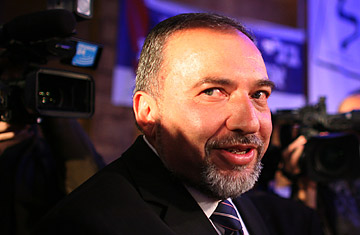
Right-wing Israeli politician Avigdor Lieberman attends a campaign rally in Kiryat Motzkin, Israel, on Feb. 5
Writing a wish on a piece of paper and sticking it into the cracks of Jerusalem's ancient Western Wall is a time-honored practice among Jews seeking God's help, so it's hardly surprising that visiting the sacred site with a message for the Almighty has become an election-eve ritual for Israeli politicians. At twilight on Monday, Israel's most controversial politician, Avigdor Lieberman, arrived with a phalanx of bodyguards and photographers and threaded his way between the black-hatted ultra-Orthodox men praying at the Wall to twist his message into a crack between the stones.
It was a shrewd campaign move in light of recent warnings by several prominent rabbis that casting a vote for Lieberman would be "strengthening Satan." A burly Soviet immigrant to Israel in the 1970s — his Hebrew still retains a Russian inflection — Lieberman provoked the rabbis' ire not only because he is a secular Jew, but also because his tough, anti-Arab slogans are luring many hawkish Israelis away from religious parties. A trip to the Western Wall was a way for Lieberman to underline his kosher credentials. (See pictures of Israel's war in Gaza.)
Many leftist Israelis would gladly stick prayers in the Western Wall too, if they believed that would stop Lieberman, whom they see as a demagogue and an anti-Arab racist, from scoring big in Tuesday's elections. In Israel's fractious political scene, it is nearly impossible today for any single party to win a simple majority in the 120-seat Knesset. There's little chance that Lieberman could be elected Prime Minister — at best, his Yisrael Beitenu Party will place third — but he is expected to emerge as the kingmaker who will decide whether the former Prime Minister Benjamin Netanyahu, of the hawkish Likud Party, or Tzipi Livni, the centrist Foreign Minister and leader of Kadima, will be Israel's next leader.
Lieberman will swap his support for key Cabinet posts for himself and his party leaders, perhaps including the all-important job of Defense Minister. He will also press for the next Israeli government to force Israel's Arab citizens to sign a loyalty oath. For many left-wing Israelis, this smacks of unforgivable racism. Arabs make up nearly 20% of Israel's population, and they already complain that they are treated as second-class citizens in the Jewish state — or worse, as a fifth column of supporters for armed Palestinian militants in Gaza and the West Bank. Israel's Arab leadership generally opposes the state being defined on Jewish lines, instead demanding that it treat all citizens as equals. For Lieberman, the last straw was the opposition expressed by Israeli Arabs to the military campaign in Gaza. But Hannah Safran, a protester outside a Lieberman rally in the port town of Haifa, which has many Arabs, says, "Many of our politicians are racist against Arabs, but didn't dare speak it aloud. But Lieberman does. It's what we get for years of saying that we had nobody to talk to among the Arabs for peace."
Lieberman's surge in the polls to edge the once-dominant Labor Party out of third place reveals a deep insecurity on the part of many Israelis, who feel surrounded by implacable enemies in the form of Hamas in Gaza and Hizballah in Lebanon, both backed by a soon-to-be-nuclear Iran. This fear was accentuated by Israel's 22-day offensive in Gaza, which inflicted widespread casualties among Palestinian civilians but failed to defeat Hamas or even stop the group from firing rockets into southern Israel. Nor did the assault manage to free a kidnapped Israeli soldier, Gilad Shalit, trapped inside Gaza for over 2 ½ years. "Nothing's changed," griped Roman Greenberg, a heavyweight boxer whose muscles bulged from within a pro-Lieberman T shirt. "And inside Israel, we had Arabs protesting against the war and waving Hamas flags. How can we accept that?"
Yisrael Beitenu has risen swiftly since Lieberman created it in 1999 as a breakaway from the right-wing Likud Party, which he thought was making too many concessions to Palestinians. In the 2003 elections, the party took seven seats, with backing mainly in Israel's large Russian-speaking immigrant community. By the 2006 elections, he had broadened its base, winning 11 seats. Now, according to polls, he could gather up to 20 seats, bumping Labor, one of Israel's classic founding parties, into fourth place. Netanyahu's Likud Party is expected to win 25 to 27 seats, and Livni's centrist Kadima 23 to 25 seats. Lieberman is the subject of a long-running police probe for corruption (he rejects any implication of wrongdoing), but that doesn't faze his fans. Nor does his selection of motley running mates: he has a former ambassador to Washington and a Likud renegade, but also a former model, a singer, a TV anchor and fellow Russian-speaking émigrés.
Among Israel's Arabs, Lieberman's rise is viewed with alarm. As one Arab schoolteacher wrote in an Israeli newspaper: "[Lieberman] hates us and incites against us, and we can see that he is doing very well: The more he incites against us, the stronger he becomes." But some Arab intellectuals see Lieberman's ascendancy as a symptom of a struggle between those Israelis who still believe in peace with the Palestinians, and those who think it is impossible to even try, and who advocate living in a constant state of military readiness against the Arab enemy. "Lieberman is a Jewish problem. Not a problem for the Arabs," says Mohammad Darawsha, a researcher and political analyst in Nazareth. Still, a sizable showing at the polls on Tuesday could enable Lieberman to put the brakes on any Arab-Israeli peace process.
— With reporting by Jamil Hamad / Bethlehem and Aaron J. Klein / Haifa
